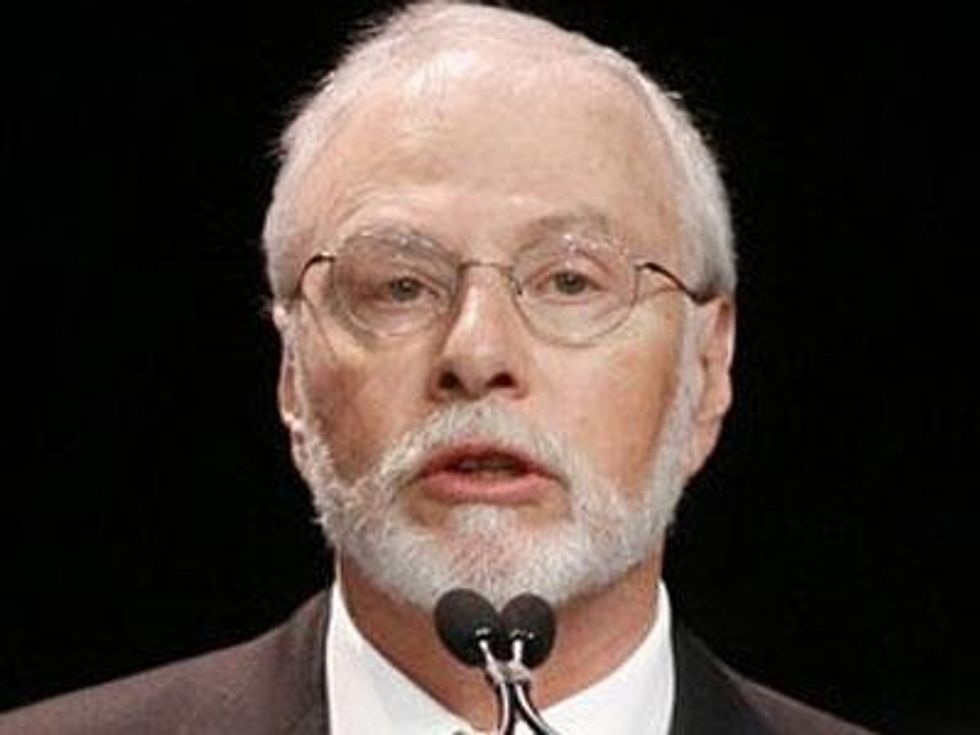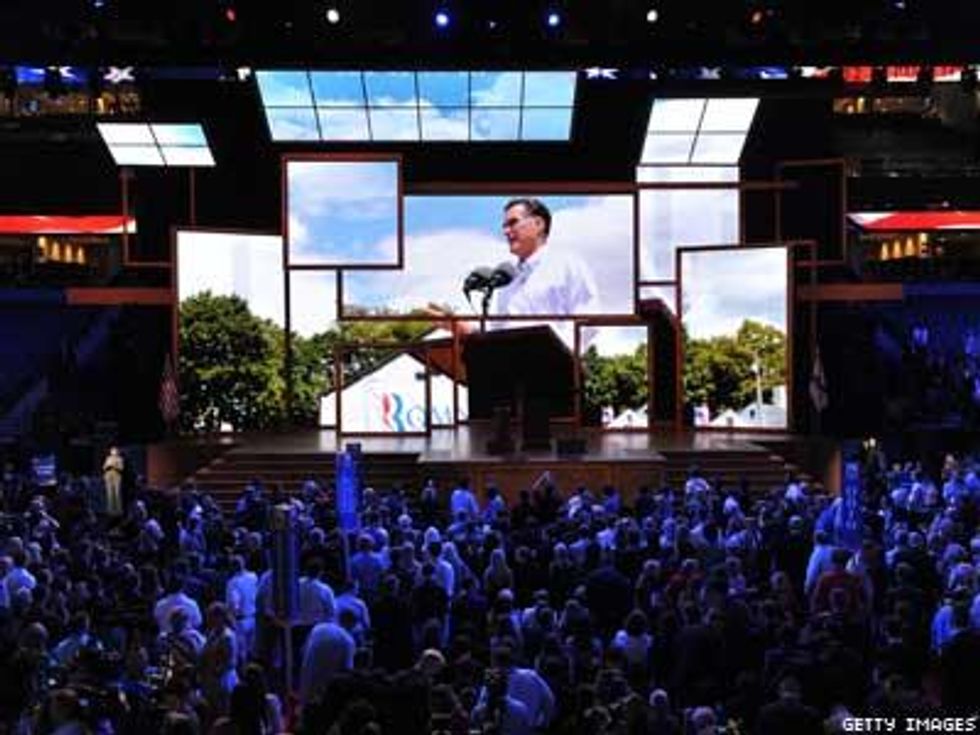
When the Republican Party campaigned on a federal marriage amendment in 2004, it sparked an outcry among gay members. Some defected, but those who stayed saw the developments as a call-to-arms. That year marked the first time the Log Cabin Republicans launched a television ad in its 30-year history, a "Defend the Constitution" spot that featured Vice President Dick Cheney speaking against a federal marriage policy. The group withheld its endorsement from President George W. Bush, but he won reelection with a strategy based partly on turnout for constitutional amendments to ban same-sex marriage in 11 states.
Gay conservatives today report similar feelings of being galvanized, but compared to eight years ago, their rallying cry includes more favorable polling, a growing list of powerful straight allies, and a rapidly evolving national conversation. As a result, some predict this year's platform will mark the last gasps of influence for social conservatives such as Tony Perkins of the Family Research Council.
"I hope that Tony Perkins enjoyed this battle, because I think he is in the middle of losing this war, if not on the back nine, and he knows it," said Sarah Longwell, a member of the leadership committee of Young Conservatives for the Freedom to Marry and a Log Cabin Republicans national board member. "I think you could characterize it as a tipping point," she said.
Perkins claimed credit for the marriage plank in this year's draft platform, criticized by some as the most antigay document to date. The language, which delegates in Tampa will approve Tuesday, includes an explicit call for a federal marriage amendment, a robust endorsement of the Defense of Marriage Act, and enthusiastic support for the multiple state campaigns underway to ban marriage equality through constitutional amendments. While this year's platform removed a plank from 2008 about the "incompatibility of homosexuality with military service," a section on "the use of the military as a platform for social experimentation" suggests the authors still want to challenge "don't ask, don't tell" repeal, which Congress passed two years ago with bipartisan support.
Gay Republicans and conservatives said the largely symbolic platform obscures a more important reality of growing support for equality, especially among younger voters who represent the future of the party. An analysis of recent polling trends among Republicans indicates overwhelming support for basic rights such as employment non-discrimination, majority support for legal partnerships similar to marriage, and growing support for marriage equality. According to a May 2012 Washington Post/ABC News poll, on the marriage question, opinion is evenly divided at 46% among Republicans ages 18 to 44, with support increasing quickly.
"The vast majority of Republican voters have moved beyond the question of whether gay and lesbian Americans should be treated equally," said Jeff Cook, senior advisor to American Unity PAC. "The discussion now is over how it should be done."
Attitudes expressed to pollsters contrast a platform process dominated by a small but vocal group with extreme antigay views. In addition to Perkins' involvement, James Bopp, an Indiana attorney who has defended the National Organization for Marriage's efforts to keep its donors secret, chaired one of the platform subcommittees. The full committee chaired by Virginia Governor Bob McDonnell shot down attempts by a minority of delegates to add civil unions and strip the DOMA language last week.
Observers offered different reasons for the platform outcome. Some said the most ideologically driven factions of the party have historically controlled the drafting process, while others suggested pro-equality forces have not yet fully penetrated state party structures. Still others saw the quadrennial ritual as a way for presidential nominees to pay homage to certain constituencies, drawing a comparison to President Obama's controversial decision to invite pastor Rick Warren to offer the invocation at the 2009 inauguration.
The Log Cabin Republicans, who participated in the platform drafting process for the first time this year, issued a statement afterward that attributed the final product to a "generational divide" but praised the "vigorous debate" that occurred. Their contingent included Kathryn Lehman, a lesbian former chief of staff for the House Republican Conference who helped write DOMA but is now lobbying to repeal the 1996 law on behalf of Freedom to Marry. Log Cabin has not yet announced whether it plans to endorse the Romney-Ryan ticket, and the group did not respond to requests for comment.
 Super PAC founder Paul Singer
Super PAC founder Paul Singer
Gay conservatives intend to be visible in Tampa. Their plans include a Wednesday brunch presented by Log Cabin and Young Conservatives for the Freedom to Marry, which launched this summer with gay and straight members. Organizers believe the event is the first ever focused on marriage equality during a Republican National Convention. The occasion has drawn about 100 RSVPs and features Andrew Langer of the Institute for Liberty.
"Our approach is to build on the dissonance that's already at play within the GOP on marriage," said Marc Solomon, national campaign director for Freedom to Marry. "About half of younger Republicans are with us, yet their voices aren't heard. We want to amplify and elevate those voices so that more conversations ensue, Republican to Republican."
Lobbyists successfully framed the dialogue in conservative terms in New York and New Hampshire, where Republican-led chambers passed a law and defeated an attempt to repeal marriage equality in the past year and a half. San Diego Mayor Jerry Sanders will make the same case in an ad set to run in the Tampa area this week, where he will connect marriage equality to "conservative values like responsibility and limited government." The ad is sponsored by Freedom to Mary and the Human Rights Campaign.
"There is nothing antithetical about being conservative and supporting the freedom to marry," said Longwell, citing the conservative principles of small government and increased individual liberty. "In fact, the two are very compatible. When that is your worldview, it is easy to see how freedom fits into that ideology."
In practice, gay conservatives acknowledge the obstacles, beginning with the political reality. Republicans who vote for marriage equality may receive generous financial support from gay conservatives and allies, but they also attract primary challengers from the right. A high-profile test will come next month, when three of the four New York Republican senators who voted for marriage equality face primary opponents. The fourth opted not to run for reelection.
Another hurdle concerns the gap between progress in the states and Congress, where representatives have been slower to embrace equality legislation. While polling indicated that three-fourths of Republicans supported "don't ask, don't tell" repeal when federal lawmakers deliberated in 2010, for example, only eight GOP senators backed the bill. American Unity PAC, launched by billionaire hedge fund manager Paul Singer with a $1 million investment in June, aims to bridge that divide. The super PAC announced last week the first three House races where it plans to advertise.
"American Unity PAC is the voice of Republican voters who are committed to equal rights and full relationship recognition for gay and lesbian Americans," said Cook. "Through its independent expenditure efforts in highly competitive congressional races, American Unity PAC is demonstrating the strong network of support that exists for inclusive Republicans. Republicans are stepping up to ensure the future of the GOP is one of inclusion."
Singer, whose gay son and son-in-law married in Massachusetts in 2009, has donated an estimated $10 million to LGBT causes. His advocacy became more visible in 2010, beginning with his co-hosting of a fundraiser for the American Foundation for Equal Rights, which filed the federal lawsuit challenging Proposition 8 in California. Ted Olson, who served as solicitor general under President George W. Bush, is one of the suit's lead attorneys. Former RNC chair Ken Mehlman, who managed the Bush-Cheney reelection campaign in 2004, came out in 2010 and serves on the AFER board. He now provides strategic advice to marriage equality advocates.
In the past two years, Singer, a major Romney donor, has contributed $1.7 million to Freedom to Marry, according to the organization. Like-minded business leaders including Dan Loeb of Third Point LLC, Seth Klarman of Baupost Group LLC, and Cliff Asness, founder of AQR Capital Management, have contributed another $800,000. Their contributions have helped to finance efforts including $3 million the organization recently poured into state ballot initiative battles in Maine, Minnesota and Washington.
 Romney video gets a trial run in preparation for RNC.
Romney video gets a trial run in preparation for RNC.
Freedom to Marry, which is nonpartisan, has made deliberate efforts to engage Republicans. The group also led the campaign to urge the Democratic Party to include marriage equality in its platform for the first time this year.
"Our goal is wining the freedom to marry nationwide in all 50 states and at all levels of government," said Solomon. "We know to make that happen, the effort needs to be bipartisan."
As of now, only one Republican member of the House has endorsed legislation to repeal DOMA, but that tally could increase when more representatives announce support after the November elections, as many expect. Republican partnership will also be needed in state legislatures for anticipated marriage equality pushes in Rhode Island, Delaware and Hawaii next year.
While a gulf exists between the parties on LGBT issues, a Harris Interactive/Logo TV poll released last week hinted at longer-term possibilities for Republicans. The survey found that 22% of LGBT voters would be more likely to vote for Mitt Romney if he held the same positions on LGBT issues as President Obama. Such a change would turn the 67%-23% edge the president currently enjoys with LGBT voters into a tie. A follow-up question found that 26% of LGBT voters would be more likely to vote for Republican candidates if the party held the same position as the Democratic Party on LGBT issues.
In the meantime, even the stark difference on marriage equality between President Obama and Mitt Romney helps gay conservatives build their case. Now that the Democratic Party has finally evolved, the focus turns to Republicans.
"You were always able to say, 'They have the same position on marriage,' and that was true up until three months ago," said Longwell. "But to take that argument away, Republicans now have to confront the fact they are legitimately on opposite sides of this issue."



 Super PAC founder Paul Singer
Super PAC founder Paul Singer Romney video gets a trial run in preparation for RNC.
Romney video gets a trial run in preparation for RNC.

































































Charlie Kirk DID say stoning gay people was the 'perfect law' — and these other heinous quotes